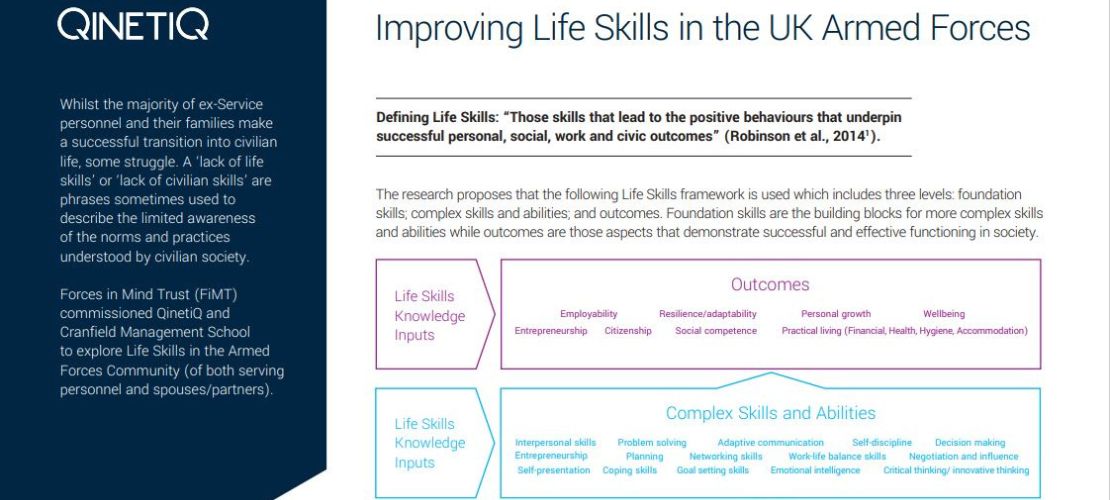-
QinetiQ appoints Corry Neale as Chief Executive, Australia Sector
01 Oct 2025
-
QinetiQ US to Shape Future Army Sensor Capabilities Through FALCONS Program
16 Sep 2025
-
New Test & Evaluation Gateway to unlock access for SMEs and boost defence innovation
10 Sep 2025
-
Engineering partnership strengthened to boost UK defence productivity
10 Sep 2025
-
QinetiQ’s Uncrewed Aerial Target milestone showcases sovereign capability
09 Sep 2025
Exploring Life Skills in the UK Armed Forces
23/11/2023

Author: Natalie Fisher, C.Psychol, AFBPsS, QinetiQ Fellow (pronouns: she/her)
Since September 2022 I have been leading a team of researchers from QinetiQ and the Cranfield School of Management to explore Life Skills in the UK Armed Forces. The study was commissioned by Forces in Mind Trust (FiMT) and looked to better understand: what are Life Skills; which Life Skills are most important for a successful and sustainable transition to civilian life; and what support is currently available to develop or improve Life Skills for adults generally?
It’s known that whilst the majority of ex-Service personnel and their families make a successful transition into civilian life and leave with valuable experience and skills, some struggle. A ‘lack of life skills’ or ‘lack of civilian skills’ are phrases sometimes used to describe the limited awareness of the norms and practices understood by civilian society and FiMT wanted to be able to understand the causes of that better.
I’m really proud that today, a little more than a year on from the start of that work, FiMT has published the report. The key findings are as follows:
- Overall there is not a significant issue with Life Skills in the Armed Forces community.
- Most serving personnel and spouses/partners assessed themselves as having good Life Skills.
- The small minority most affected by poor Life Skills tended to be those lower in rank and younger in age, who have not had the chance to develop their skills, or who had poor Life Skills on joining.
For a little more depth, click on the below infographic which outlines some of the key findings:
This study builds on the team’s research capability in the veteran space having worked on a number of other employment-related projects for FiMT, including:
- A study exploring the Longer-Term Employment Outcomes of Ex-Service Personnel: Longer-Term-Employment-Outcomes_FINAL.pdf (pcdn.co)
- A project looking at military spousal/partner employment: Identifying the barriers and support required: Employment-Research-report-ONLINE-COPY.pdf (aff.org.uk)
- A deep dive into Senior Non-Commissioned Officers and Employment after Leaving the UK Armed Forces: 20200814-Final-report.pdf (pcdn.co)
- An exploration of Self-Employment and the Armed Forces Community: self-employment-armed-forces-community.pdf (fim-trust.org)
As with the previous studies I hope the FiMT research will further support the development of Life Skills in the Armed Forces community and the transition back into civilian life for ex-Service personnel and their families.
As an Occupational Psychologist at QinetiQ I work with mission critical systems and environments, where mistakes could result in loss of life or valuable assets. My role is to apply my own and leading academic research findings to complex operational issues and help my customers understand how those research findings could improve the efficiency and effectiveness of their organisation. I sit within the multi-disciplinary Human Performance team of nearly 100 experts who focus on all issues human, from psychology to physiology, relevant to all domains.
